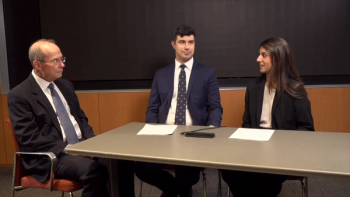
Studying role of depression, stress, and meditation in glaucoma
According to Sarah Van Tassel, MD, physicians may need to recognize issues and treat patients more holistically.
Reviewed by Sarah Van Tassel, MD
There is more to glaucoma than simply the degree to which the disease affects the eye.
Recent studies have indicated that glaucoma and depression may be linked. Physicians treating glaucoma patients may need to stretch their care profile to include this recognition and treat their patients more holistically.
Lifting the curtain on depression
Depression is a topic that may not be addressed adequately in patients with glaucoma because of the emphasis on therapies to control the IOP and progression of visual field damage.
However, Sarah Van Tassel, MD, pointed out that as with other chronic diseases such as diabetes, addressing depression can mediate patient outcomes by improving adherence to medications and recommended follow-up examinations. She is the director of the Glaucoma Service and Glaucoma Fellowship at Weill Cornell Medicine, New York.
In glaucoma, this may also be the case. For example, as a result of depression, these patients may not return for recommended glaucoma visits in a timely fashion or have inadequate adherence to their treatment regimens. Both can lead to progression of glaucoma.
So, while it seems possible that depression can lead to postponed intervention for and progression of glaucoma, the question arises about reverse causality. Does glaucoma lead to the development of depression?
The answer, Van Tassel said, may be yes. She cited a large Taiwanese study1 in which patients with glaucoma were shown to have a significantly higher risk of developing incident depression compared to matched controls. The possible mechanisms cited by the authors included decreased visual acuity, reduced visual function, circadian rhythm disruption. Proposed common threads between glaucoma and depression include reduced brain-derived neurotropic factor, neuroinflammation, autonomic dysfunction, and lifestyle.
Evaluating glaucoma patients with depression from outside of the proverbial box may be an untapped pathway to improve patient outcomes and one that has been overlooked until now.
“We know about the growing emphasis on selective laser trabeculoplasty as a result of the LiGHT trial and updated American Academy of Ophthalmology Preferred Practice Patterns, but in depressed patients in particular, prioritizing treatment options that do not involve eye drops may be important,” she stated.
Physicians can take the additional steps of encouraging visits with mental health professionals as well as offering their own support to patients. The latter can involve simply asking about their current status to start the conversation about seeking the advice of another professional clinician.
Destressing patients
While we know that stress can elevate IOP in healthy as well as glaucomatous eyes, less is known about stress and the glaucoma disease process.
Regarding glaucoma and stress, Van Tassel cited a study2 that included 60 glaucomatous eyes on maximal medical therapy and IOPs exceeding 21 mm Hg; all eyes were scheduled to undergo trabeculectomy. The patients were randomly assigned for 3 weeks to either IOP therapy and 45 minutes of mindfulness meditation or continuation of their IOP therapy alone.
The authors reported that there was a decrease in IOP in the patients randomized to meditation from about 20 mm Hg to about 15 mm Hg; in the control group, the IOP was stable.
“Importantly, 15 eyes in the intervention group and no eyes in the control group avoided trabeculectomy out to 9 weeks of follow up,” Van Tassel reported.
The study authors commented that “the moment you change the perception is the moment that you rewrite the chemistry of your body.”
Van Tassel explained that the authors investigated gene expression in the trabecular meshwork specimens obtained during trabeculectomy from both study groups. They found up-regulation of NOX1 and NOX3 in the meditation group, which increases nitric oxide and trabecular outflow and up-regulation of neuroprotection genes and down-regulation of proinflammatory genes.
“Depression and glaucoma are related,” Van Tassel concluded. “Physicians can inquire about patients’ mental health and refer them to mental health clinicians, which may help improve their glaucoma. Stress reduction may also have a meaningful impact on glaucoma.”
Sarah Van Tassel, MD
This article is adapted from Van Tassel’s presentation at the annual meeting of the American Society of Cataract and Refractive Surgery in Washington, DC. She has no financial interest in this subject matter.
Reference
1. Chen Y-Y, Lai Y-J, Wang J-P, et al. The association between glaucoma and risk of depression: a nationwide population-based cohort study. BMC Ophthalmol 2018 Jun 22;18(1):146; doi: 10.1186/s12886-018-0811-5.
2. Dada T, Bhai N, Midha N, et al. Effect of mindfulness meditation on intraocular pressure and trabecular meshwork gene expression: a randomized controlled trial. Am J Ophthalmol 2021;223:308-321.
Newsletter
Don’t miss out—get Ophthalmology Times updates on the latest clinical advancements and expert interviews, straight to your inbox.





























